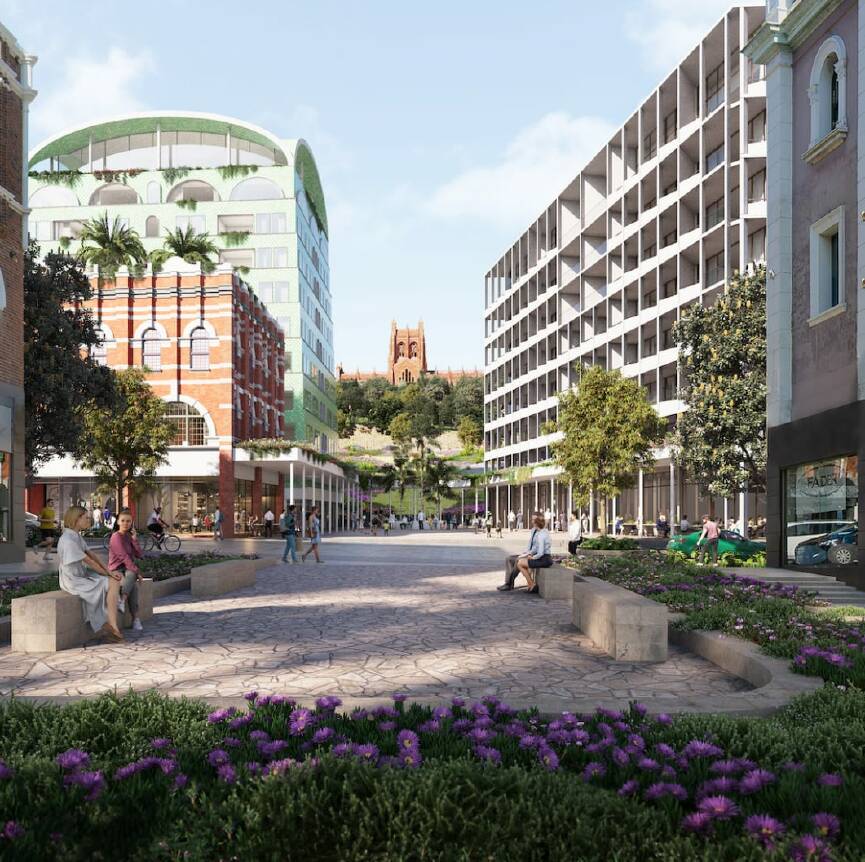
Iris Capital's latest effort to win approval for the rest of its Hunter Street Mall apartment redevelopment has attracted a whopping 268 public submissions.
Iris applied for a review in June after the Hunter Central Coast Regional Planning Panel rejected stages three and four of the EastEnd project because they had had an "unacceptable" impact on views and parking and differed too greatly from a concept plan approved in 2018.
The developer warned at the time that the decision could leave the site as a "hoarded-up hole in the ground for years to come".
This sentiment found its way onto posters some residents stuck around EastEnd stage one apartment buildings during the review public submission period last month.

The posters asked residents if they wanted the mall to "look like" the artist's impressions Iris has used to market the EastEnd project or "stay like this for years", pointing to pictures of boarded up shopfronts and graffiti-covered walls.
The posters included a QR code link to the same question on the StrawPoll website, where 98.52 per cent of 405 respondents were apparently in favour of Iris' plans.
The 268 public submissions on Iris's review application tell a different story.
Many are from those opposing the $145 million project, including Newcastle independent lord mayoral candidate Ross Kerridge and Newcastle Inner City Residents Alliance (NICRA).
Dr Kerridge's submissions says Iris's plan will affect views to and from Christ Church Cathedral and amounts to a "betrayal of the previously agreed planning guidelines for the old city area".
"Unfortunately, the proposed development appears to envisage the development of (yet more) luxury apartments that will probably be purchased by wealthy retirees who will have low levels of occupancy and activity in the area," he wrote.
"It represents an enormous loss of opportunity to make this one of the most exciting urban developments in Australia.
"The rejection of the modification was entirely correct and the modification should not be supported."

Iris diverged from its approved concept plan after City of Newcastle demolished the King Street car park, opening up the possibility of a view corridor and "Stairway to Heaven" from the harbour to the cathedral.
The Iris changes, which included "remassing" some buildings with more height and density in return for a public plaza, drew sharp criticism from Heritage NSW, the National Trust, the Newcastle Club, Anglican Dean Katherine Bowyer, Newcastle East Residents Group and NICRA.
High-profile Newcastle engineer Neil Petherbridge, a former Property Council Hunter chair, wrote in his capacity as an EastEnd stage one resident that he agreed with the planning panel's decision to refuse the development over a "113-space" parking deficiency.
"The significant limitation of available car parking is currently a major issue for the CBD," he said in his submission on the Iris review.
"The reliance on on-street and public parking to address this deficit is not a reasonable outcome."
The Iris plans won "wholehearted" support from the council's independent Urban Design Review Panel, which said in a report that it had provided expert guidance on the project for more than two decades and was satisfied the developer's plans were in the public interest.
The UDRP report said reshaping the Iris proposal in light of the car park demolition was an "opportunity that the panel considered should not be missed".
The panel said the modified plans would enhance public views, rather than hinder them, and have a "low" to "moderate" impact on a "limited number" of private views.
"The Concept's parking provisions are consistent with CN's current controls, which in the UDRP's experience are functioning as anticipated and which reflect the City's adopted strategies to reduce car dependency over time," the report says.
"The Panel considered the 26 visitor parking space deficit for Stages 3 and 4, being the basis of the Concept Modification, to raise no significant impacts on the basis of being adequately accommodated by available on street parking."
Iris has not modified its plans for stages three and four as part of its review application.
A HCCRPP panel with different members to the original panel will assess the review application.







